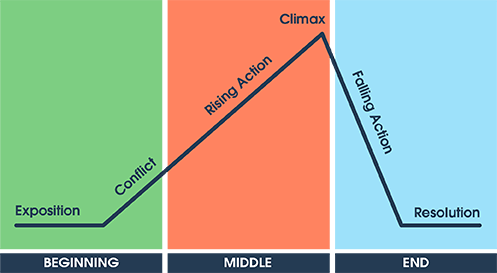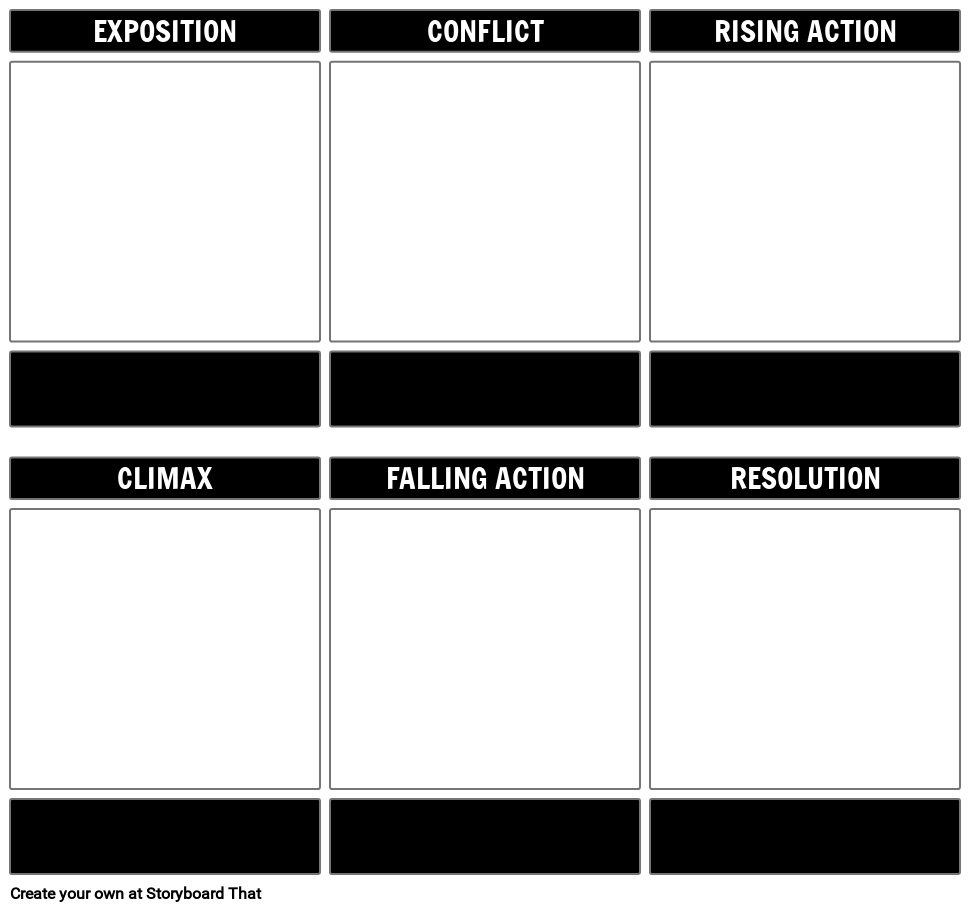Lesson Plan Overview
A common use for Storyboard That is to help students create a plot diagram of the events from a story. Not only is this a great way to teach the parts of the plot, but it reinforces major events and help students develop greater understanding of literary structures.
Students can create a storyboard capturing the narrative arc in a work with a six-cell storyboard containing the major parts of the plot diagram. For each cell, have students create a scene that follows the story in sequence using: Exposition, Conflict, Rising Action, Climax, Falling Action, and Resolution.
Example The Adventures of Tom Sawyer Plot Diagram
Exposition
Tom Sawyer lives in St. Petersburg, Missouri with his Aunt Polly, cousin Mary, and brother Sid. Tom is a mischievous twelve-year-old with a vivid imagination. He routinely skips school and chores in favor of playing pirates, robbers, and other adventures with his friends.
Conflict
During one of Tom’s midnight adventures with his friend Huck, the two witness Injun Joe murder Dr. Robinson. When they discover that Muff Potter has been arrested for the murder, they are too afraid to reveal the truth.
Rising Action
When Injun Joe disappears, Tom returns to his old ways. He and his friends run away to Jackson’s Island and return days later to attend their own funeral. Later, they spy Injun Joe returned in disguise with a secret treasure. Fascinated, Huck stays in town to watch Joe, while Tom goes on an outing with Becky Thatcher to McDougal’s cave.
Climax
Huck overhears Injun Joe’s plans to kill the Widow Douglas. He runs for help just in time to save her. Shortly afterward, Tom spots Injun Joe in the cave.
Falling Action
The Widow Douglas takes in Huck and cares for him while he is sick. Tom and Becky escape from the cave, and Judge Thatcher seals it up, unwittingly trapping Injun Joe and causing his death by starvation.
Resolution
Tom and Huck uncover Injun Joe’s treasure in the cave. Between their adventures, heroism, and newfound wealth, the two have become a celebrated pair in St. Petersburg.
Template and Class Instructions
(These instructions are completely customizable. After clicking "Copy Activity", update the instructions on the Edit Tab of the assignment.)
Student Instructions
Create a visual plot diagram of The Adventures of Tom Sawyer.
- Separate the story into the Exposition, Conflict, Rising Action, Climax, Falling Action, and Resolution.
- Create an image that represents an important moment or set of events for each of the story components.
- Write a description of each of the steps in the plot diagram.
Lesson Plan Reference
Student Rubric
(You can also create your own on Quick Rubric.)
| Proficient 33 Points | Emerging 25 Points | Beginning 17 Points | |
|---|---|---|---|
| Design and Creative Elements | Creativity and imagery are used effectively (helps to tell the story). At least three Textables are included in plot diagram. | Creative elements (clipart) are somewhat distracting. At least two Textables throughout their plot diagram. | Creativity is minimally apparent, and the overall design shows a lack of effort. Clipart may be confusing and distract from the story. Student used one or fewer Textables. |
| Spelling and Grammar | Spelling within the Textables is mostly correct (fewer than eight errors). Grammar does not hinder understanding. | Spelling within textables is somewhat correct (fewer than 10 errors). Grammar may hinder some understanding or make reading difficult. | Spelling is mostly incorrect (10 or more errors). Grammar severely hinders understanding. |
| Plot Elements | There are three complete slides: one for beginning, one for the middle, and one for the end. Slides explain the work of prose and are easy to follow. | There are three cells, but one or two do not depict the correct element within the work of prose (e.g. the beginning is misplaced). Story is somewhat difficult to follow. | One or more cells is missing. Only one part of the plot is represented (e.g. only the beginning). Story is hard to follow. |
Lesson Plan Overview
A common use for Storyboard That is to help students create a plot diagram of the events from a story. Not only is this a great way to teach the parts of the plot, but it reinforces major events and help students develop greater understanding of literary structures.
Students can create a storyboard capturing the narrative arc in a work with a six-cell storyboard containing the major parts of the plot diagram. For each cell, have students create a scene that follows the story in sequence using: Exposition, Conflict, Rising Action, Climax, Falling Action, and Resolution.
Example The Adventures of Tom Sawyer Plot Diagram
Exposition
Tom Sawyer lives in St. Petersburg, Missouri with his Aunt Polly, cousin Mary, and brother Sid. Tom is a mischievous twelve-year-old with a vivid imagination. He routinely skips school and chores in favor of playing pirates, robbers, and other adventures with his friends.
Conflict
During one of Tom’s midnight adventures with his friend Huck, the two witness Injun Joe murder Dr. Robinson. When they discover that Muff Potter has been arrested for the murder, they are too afraid to reveal the truth.
Rising Action
When Injun Joe disappears, Tom returns to his old ways. He and his friends run away to Jackson’s Island and return days later to attend their own funeral. Later, they spy Injun Joe returned in disguise with a secret treasure. Fascinated, Huck stays in town to watch Joe, while Tom goes on an outing with Becky Thatcher to McDougal’s cave.
Climax
Huck overhears Injun Joe’s plans to kill the Widow Douglas. He runs for help just in time to save her. Shortly afterward, Tom spots Injun Joe in the cave.
Falling Action
The Widow Douglas takes in Huck and cares for him while he is sick. Tom and Becky escape from the cave, and Judge Thatcher seals it up, unwittingly trapping Injun Joe and causing his death by starvation.
Resolution
Tom and Huck uncover Injun Joe’s treasure in the cave. Between their adventures, heroism, and newfound wealth, the two have become a celebrated pair in St. Petersburg.
Template and Class Instructions
(These instructions are completely customizable. After clicking "Copy Activity", update the instructions on the Edit Tab of the assignment.)
Student Instructions
Create a visual plot diagram of The Adventures of Tom Sawyer.
- Separate the story into the Exposition, Conflict, Rising Action, Climax, Falling Action, and Resolution.
- Create an image that represents an important moment or set of events for each of the story components.
- Write a description of each of the steps in the plot diagram.
Lesson Plan Reference
Student Rubric
(You can also create your own on Quick Rubric.)
| Proficient 33 Points | Emerging 25 Points | Beginning 17 Points | |
|---|---|---|---|
| Design and Creative Elements | Creativity and imagery are used effectively (helps to tell the story). At least three Textables are included in plot diagram. | Creative elements (clipart) are somewhat distracting. At least two Textables throughout their plot diagram. | Creativity is minimally apparent, and the overall design shows a lack of effort. Clipart may be confusing and distract from the story. Student used one or fewer Textables. |
| Spelling and Grammar | Spelling within the Textables is mostly correct (fewer than eight errors). Grammar does not hinder understanding. | Spelling within textables is somewhat correct (fewer than 10 errors). Grammar may hinder some understanding or make reading difficult. | Spelling is mostly incorrect (10 or more errors). Grammar severely hinders understanding. |
| Plot Elements | There are three complete slides: one for beginning, one for the middle, and one for the end. Slides explain the work of prose and are easy to follow. | There are three cells, but one or two do not depict the correct element within the work of prose (e.g. the beginning is misplaced). Story is somewhat difficult to follow. | One or more cells is missing. Only one part of the plot is represented (e.g. only the beginning). Story is hard to follow. |
How Tos about Tom Sawyer Summary
Incorporate Character Analysis into Your Tom Sawyer Lesson
Enhancing your literature unit with character analysis helps students deeply understand motivations, relationships, and growth in Tom Sawyer.
Introduce main characters with a class discussion
Guide students to identify Tom, Huck, Becky, and other key figures. Discuss their traits, relationships, and roles in the story to build background knowledge.
Assign students to track character actions and choices
Ask students to note what each main character does, says, and feels throughout the plot. Encourage them to focus on moments that reveal personality or growth.
Facilitate small group discussions on character changes
Divide students into groups to talk about how and why Tom, Huck, or Becky change during the story. Promote using evidence from the text to support their ideas.
Have students create a character map or profile
Direct students to visually organize details about a chosen character using a graphic organizer. Include traits, significant actions, relationships, and important quotes.
Encourage students to share and compare analyses
Invite students to present their character maps or findings to the class. Discuss similarities and differences in interpretations to foster critical thinking.
Frequently Asked Questions about Tom Sawyer Summary
What is a plot diagram for The Adventures of Tom Sawyer?
A plot diagram for The Adventures of Tom Sawyer visually breaks down the story into key parts: Exposition, Conflict, Rising Action, Climax, Falling Action, and Resolution. It helps students track major events and understand the narrative structure.
How can I teach Tom Sawyer’s plot structure to middle school students?
To teach Tom Sawyer’s plot structure, have students create a six-cell storyboard with scenes for each plot part. This hands-on activity lets students visualize and summarize the main events in sequence, reinforcing comprehension and literary analysis.
What are the main events in The Adventures of Tom Sawyer’s plot?
The main events include: Tom’s mischievous life in St. Petersburg, witnessing a murder, running away, spying on Injun Joe, rescuing the Widow Douglas, escaping the cave, and finding treasure. Each event corresponds to a part of the plot diagram.
Why is using a storyboard effective for teaching literature?
Using a storyboard engages students visually and creatively, helping them break down complex stories, remember key events, and grasp literary elements like plot, conflict, and resolution. It also supports different learning styles.
What are some quick lesson ideas for teaching The Adventures of Tom Sawyer?
Quick lesson ideas include: creating a visual plot diagram, acting out scenes, discussing character motivations, comparing Tom to modern kids, or having students write alternative endings. These activities promote engagement and understanding.
More Storyboard That Activities
Adventures of Tom Sawyer, The
Testimonials

“By using the product, they were so excited and they learned so much...”–K-5 Librarian and Instructinal Technology Teacher

“I'm doing a Napoleon timeline and I'm having [students] determine whether or not Napoleon was a good guy or a bad guy or somewhere in between.”–History and Special Ed Teacher

“Students get to be creative with Storyboard That and there's so many visuals for them to pick from... It makes it really accessible for all students in the class.”–Third Grade Teacher
© 2026 - Clever Prototypes, LLC - All rights reserved.
StoryboardThat is a trademark of Clever Prototypes, LLC, and Registered in U.S. Patent and Trademark Office








